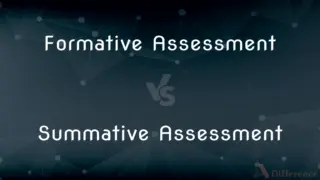Section in Law vs. Clause in Law — What's the Difference?
Edited by Tayyaba Rehman — By Fiza Rafique — Published on December 3, 2023
A "Section" in law refers to a distinct, numbered provision in a statute. A "Clause" in law denotes a specific provision within a section or contract.

Difference Between Section in Law and Clause in Law
Table of Contents
ADVERTISEMENT
Key Differences
Within the realm of legal documentation and statutes, a "Section in Law" and a "Clause in Law" serve to organize and clarify legal provisions. The former breaks down laws into numbered segments, while the latter provides specific points or provisions within these segments or contracts.
A "Section in Law" is akin to a chapter in a book, providing a broad overview or topic within a legal document. On the other hand, a "Clause in Law" can be equated to a specific sentence or paragraph within that chapter, giving details about the main topic.
Both the "Section in Law" and "Clause in Law" are instrumental in providing clarity and structure to legal documents. While the section provides an umbrella topic or provision, the clause drills down to specifics, offering details or conditions related to the section.
Legal professionals and laypeople alike refer to sections to understand the broad intent of a law. Meanwhile, clauses become essential when one needs to grasp the nitty-gritty details or specific conditions attached to a broader legal provision.
To summarize, while both "Section in Law" and "Clause in Law" are organizational tools in legal documentation, they operate at different levels. Sections offer broad overviews, and clauses delve into specifics.
ADVERTISEMENT
Comparison Chart
Purpose
Provides a main provision or topic.
Gives specific details or conditions.
Comparison
Similar to a chapter in a book.
Similar to a sentence in a chapter.
Scope
Broader
Narrower
Usage
Found in statutes, codes, etc.
Found within sections or contracts.
Reference
Often numbered for easy reference.
Not typically numbered but can be itemized.
Compare with Definitions
Section in Law
A primary division in laws or codes addressing a specific topic.
The law's Section 8 pertains to environmental protections.
Clause in Law
A detailed segment within a section or contract.
The clause in Section 4 details the penalties for non-compliance.
Section in Law
A broad categorization in statutes for organizing content.
Section 3 of the code outlines the responsibilities of landlords.
Clause in Law
A term that outlines particular details or stipulations.
The confidentiality clause is standard in most employment contracts.
Section in Law
An umbrella term in a statute under which specific provisions fall.
All matters related to taxation are covered under Section 9.
Clause in Law
A precise point in legal statutes or agreements.
The indemnification clause protects the company from certain lawsuits.
Section in Law
A numbered segment in legal documentation offering clarity.
According to Section 12, employers must provide safe working conditions.
Clause in Law
A specific provision or condition in a legal document.
The non-compete clause prevents employees from joining competitors immediately.
Section in Law
A distinct provision within a legal statute.
Section 5 of the Act focuses on consumer rights.
Clause in Law
An itemized or detailed provision providing clarity.
The arbitration clause specifies how disputes will be resolved.
Common Curiosities
Is a clause more detailed than a section?
Typically, yes. Clauses specify details or conditions related to a section or contract topic.
Can a "Section in Law" contain multiple "Clauses in Law"?
Yes, sections often have several clauses detailing specific provisions.
Are all clauses found within sections?
Not always; clauses can also appear in contracts, agreements, or even within other clauses.
Why are sections numbered in legal documents?
Numbering provides easy reference and clarity when discussing or citing laws.
Can a legal statute have sections without any clauses?
Yes, some sections may be straightforward and not require further clarification via clauses.
Why is the distinction between sections and clauses important?
Understanding both aids in comprehending the scope and specifics of legal documents.
How does one refer to a specific point in a law?
Typically, by referencing the relevant section number and, if needed, the specific clause.
Can a single law have multiple sections?
Yes, laws often have multiple sections to address various provisions or topics.
What is the primary role of a "Section in Law"?
It provides a distinct provision or topic within a legal statute.
Are clauses always part of larger legal documents?
Most often, yes. Clauses detail specific points in contracts, statutes, or other legal texts.
What happens if a clause contradicts a section?
Typically, clauses provide specifics, but any contradiction may need legal interpretation or correction.
Can a clause be as long as a section?
While sections are usually longer, a clause can also be lengthy, depending on its content.
Are sections and clauses unique to American law?
No, many legal systems worldwide use similar structures to organize their statutes.
Which is more general: a section or a clause?
A section is generally broader, while a clause offers more specific details or conditions.
Is a clause's content always legally binding?
In contracts, clauses are typically binding, but their enforceability can vary based on jurisdiction and context.
Share Your Discovery

Previous Comparison
Formative Assessment vs. Summative Assessment
Next Comparison
Chemical Synapse vs. Electrical SynapseAuthor Spotlight
Written by
Fiza RafiqueFiza Rafique is a skilled content writer at AskDifference.com, where she meticulously refines and enhances written pieces. Drawing from her vast editorial expertise, Fiza ensures clarity, accuracy, and precision in every article. Passionate about language, she continually seeks to elevate the quality of content for readers worldwide.
Edited by
Tayyaba RehmanTayyaba Rehman is a distinguished writer, currently serving as a primary contributor to askdifference.com. As a researcher in semantics and etymology, Tayyaba's passion for the complexity of languages and their distinctions has found a perfect home on the platform. Tayyaba delves into the intricacies of language, distinguishing between commonly confused words and phrases, thereby providing clarity for readers worldwide.












































